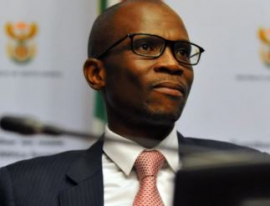
As the country focuses on economic recovery and reconstruction, Deputy Minister of Finance, Dr David Masondo, has called on the metropolitan municipalities to create a conducive business environment to enable investments.
“There are economic opportunities, which can be explored by private sector institutions within the area of your jurisdiction. However, these opportunities heavily rely on your capacity to provide bulk and connector infrastructure to enable such investments,” Masondo said on Thursday.
Addressing the Metropolitan Municipalities Roadshow on the Economic Reconstruction and Recovery Plan in Pretoria, Masondo said there are also a number of approval processes that are taking place at the metro level to enable private sector institutions to invest.
“Thus, the metros need to create a conducive business environment through streamlining and ensuring more efficient internal business processes that interface with the private sector. Such business processes relate to supply chain management, issuing of business permits, responding to customer complaints, issuing of rates and services accounts, development approval processes, issuing of construction permits and rates clearance certificates and ensuring electricity connections,” the Deputy Minister said.
Together with the World Bank, government has introduced the Ease of Doing Business project, which drives the reforms at national and subnational level to make the country more competitive and business friendly.
“The Sub-National Doing Business reforms that we are rolling out in partnership with the metros are a core component of this broader programme. A major component of this reform process is the optimisation and automation of metro business processes in order to reduce time, cost and numbers of procedures that businesses have to experience,” the Deputy Minister said.
He expressed concern on the failure of many metros to spend on their capital budgets, placing some of the local government conditional grants in jeopardy.
“From our engagements with yourselves, we have identified two major constraints on metro performance in this regard. First, is the metro internal Supply Chain Management (SCM) processes, which are lengthy and tedious. Secondly, it is owing to the criminal elements which have mushroomed under the disguise of 30% requirements of the Preferential Procurement Policy Framework Act (PPPFA),” the Deputy Minister said.
He acknowledged that part of the problem regarding the slow pace of capital spend, is a lack of a project pipeline in some metros.
“To address this concern a project and programme preparation grant will be introduced effective from your new financial year. We urge you to maximize on the use of this grant on major infrastructure projects, which prepare them in a manner that will assist the city to accelerate the infrastructure built programme. Infrastructure investment that can unlock private investment in targeted spatial areas should be prioritised,” the Deputy Minister said.
Masondo emphasised the importance for metropolitan municipalities to strengthen governance in the city.
“A clear demonstration of this should be reflected in the capacity of the city to reduce the unauthorised, irregular, fruitless and wasteful expenditure (UIFW). It is discomforting that this has been increasing over the years and it does not look like there is an appetite to reduce it. We should be aware that the credit rating has started factoring this issue, which has resulted in a decrease in the credit rating,” the Deputy Minister said.
He expressed concern that the Municipal Public Accounts Committee (MPAC) does not look like there it has any form of consequence management.
“The capacity of the city to borrow will soon reflect this poor credit rating leading to expensive debt and in some instances reluctance of the financial institutions to borrow you money that is critical for growth enhancing investments.
“The institutional stability of the city is paramount for the successful implementation of the economic recovery. We are concerned about the high turnover at the executive level. This does not build confidence.
“As political principals, it is your duty to ensure that there is a stability to enable the institution to focus on service delivery. Such stability is possible - eThekwini, for example, has retained the same Chief Financial Officer (CFO) for around 20 years,” the Deputy Minister said. – SAnews.gov.za


